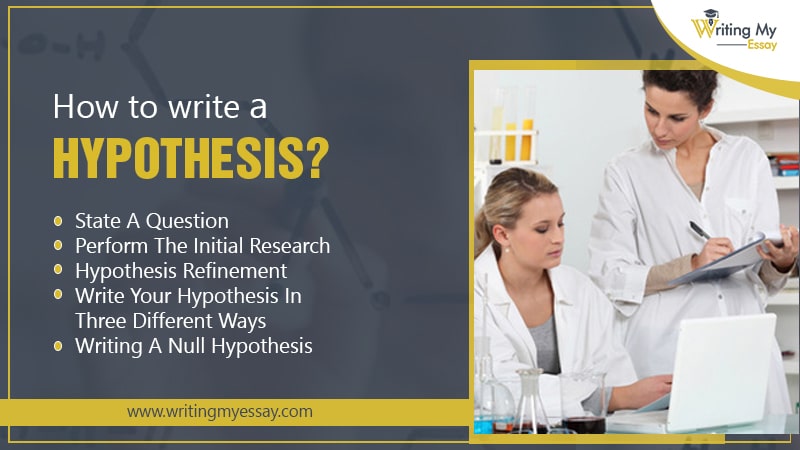A hypothesis statement symbolizes what someone “thinks” will happen when an experiment is performed. It can be used in research for any scientific field, such as psychology, biology, etc. It can be seen as a basis for future experiments and research work. Thus, one has to have the knowledge and understanding of drafting a well-structured strong hypothesis statement.
Is it your first time interacting with a hypothesis statement? no worries, you can go through with this example:
“If a student distracts from his studies during exams, then the result will be less productive.”
Does this statement ring a bell? Seems like a pretty common approach used in writing scientific papers. What you have just read is called a “hypothesis” statement. It is an assumption that is based on supporting evidence, which has to be proved with the help of examples, data, and facts.
A lot of times people find hypothesis writing quite confusing. But, once you learn it you will find it much easier to work on your hypothesis project.
In this blog, we will dig deep to help you understand what is hypothesis, how to write a hypothesis, and also share some expert tips to ensure you will not fear it anymore.

Contents
What Is A Hypothesis?
A hypothesis is a prediction, but not merely a vague guess. You can look at a hypothesis as a tentative answer to your research queries that have not been proven yet. It begins with a question that is further explored by performing extensive research. There could be some research projects for which you might be required to state different hypotheses to address each one of the aspects of the research question.
Hypothesis Definition
If you are still wondering what is a hypothesis, let us make us clear to you. A hypothesis can be defined as an assumption that a researcher makes based on the existing knowledge. When we have some initial level research questions, a hypothesis is used for translating them into a more logical prediction that is supported by facts, and evidence we have in hand.
When it comes to working on a problem it is essential to first recognize the problems, or note down the questions. Then, the initial research has to be conducted after which all the research questions have to be answered with the help of experiments and studying the results. Hypothesis-based approaches are not limited to a research paper, thesis, and synthesis essay but are commonly used among scientific academic works.
But, before performing the experiments it is essential to identify to predict the outcomes completely based on the data, and facts. This is when a scientist of the researcher has to make a well-informed guess. This is the part where a hypothesis statement is written which later has to be proven or disproved with their study.
Difference Between Hypothesis And Prediction
While both, hypothesis and prediction are a form of guess, there is a difference between them.
A hypothesis is a well-grounded and provisional assumption that is drawn with the help of credible facts, and data. It acts as an initial point for further examination. It works as the progress of knowledge. It is a well-educated guess made in scientific projects. The hypothesis only states the variables that can be further tested. There are no vague statements.
Whereas, a prediction is more like a forecast. It is an estimation based on the observations that work as the ground for future projections. A prediction could never be seen as a hypothesis.
However, if a hypothesis turns out to be true then it can be seen as a prediction. You can predict the results of an experiment based on a hypothesis that you have stated.
Let us look at a distinguishing example.
Hypothesis: Fewer than 8 hours of sleep causes less productivity.
Prediction: If an individual gets less than 8 hours of sleep, then the individual will be less productive.
How To Write A Hypothesis?
Hopefully, our hypothesis definition helped you clarify what exactly this type of statement is all about, and how it is different from a prediction. Let us now move ahead and help you with the right way to structure a hypothesis paper.

- State A Question
As per the procedure, the research question always comes at the starting of a hypothesis. You need to make sure that your question is focused, clear, and has scope for research but within the project constraints. It is also crucial that the question could be tested and there has to be a hypothesis to answer the question.
- Perform The Initial Research
Since by now you know what is a hypothesis, you must be having some idea of a descriptive essay or what we mean by initial research. It is an educated guess based on the expected outcomes of an experiment. You have to gather all the data that answers your research question. This data could be the information you have in hand from the existing theories, studies, or research papers.
You have to draw an assumption by answering the question, completely based on the discoveries from the collected data. The guess has to hold some logic.
- Write A Hypothesis
After the initial research work, you would get some idea about what more you can expect during the entire research. At this point, you have to be clear with the answer. This information is highly important and plays a significant role in shaping up your hypothesis.
Your hypothesis can be stated in different ways. It all depends on your project type and the form of hypothesis you will be using in your project.
- Hypothesis Refinement
So you have started a hypothesis, but is it testable and specific? You can refine and phrase your hypothesis in plenty of ways. Just make sure that all the terms are clearly defined and include all these elements.
- There need to be some relevant variables.
- There has to be a specific group that is being studied.
- You must include a predicted outcome or results of your experiment or analysis.
- Write Your Hypothesis In Three Different Ways
In order to determine the variables, you can phrase your predations in the “if…then” form. In this way, you will be able to state the independent variable at the beginning of your sentence, while the dependent variable would come at the end.
Here is an example.
“If an individual starts taking 8 hours of sleep, then the individual will be more productive.”
When it comes to academic research, a hypothesis is formulated in respect of showing the effects or defining the correlations. You are required to state a direct relationship between both variables.
In case there is a comparison between two groups, you can use a hypothesis to tell the difference you expect between the variables.
- Writing A Null Hypothesis
In case there is statistical hypothesis testing involved in your research then you also need to formulate a null hypothesis. You can write null hypothesis as H0, and use H1, H2 as alternatives. As per the null hypothesis definition, it is a statistical hypothesis that states that there is no association between the two variables.
H0: The number of lectures attended by students has no effect on their exam scores.
H1: The number of lectures attended by students has a positive effect on their exam scores.
Expert Tips For Hypothesis Writing
If you wish to learn how to write a hypothesis that is well-crafted consider going through a scientific research paper written by an expert. That will provide you an in-depth understanding of hypothesis writing.
Here are some useful tips that will make it easy for you to write a hypothesis.
- State your question in the beginning: As you start writing your hypothesis research paper make sure to state the question in the starting. You need to be sure and careful about the question you have chosen to study.
- A hypothesis is not a question, rather a statement: It is important to understand that a hypothesis is a testable and educated guess about the outcomes of an experiment. Do not confuse it with being a question in your research work.
- Keep it clear: You have to be very clear and specific with the language you use in your hypothesis. It needs to be simple and easy to understand. Define every aspect and variable of your research precisely. It should give a clear idea to the assessor about your thoughts at the beginning on what would happen as the research progresses.
- Remember all the variables: All the variables in your research have to be defined clearly. The terms you use for the variables should be precisely stated. You need to address all the aspects, such as:
- Who are the participants?
- What changes will occur during the experiment?
- What will be the effects and results of the changes?
- Your hypothesis has to be testable: It is essential that state the relationship between the two variables in order to prove or refute the hypothesis. Your hypothesis must allow scope for observations. Also, it must demonstrable with an analysis or experiment.
There are a few things that you must take care of to make your hypothesis testable.
- Indulge in deep thinking to decide upon the type of experiments you will require to perform to test your hypothesis.
- You should clearly identify the variables in your project, very carefully.
- Consider all the independent and dependent variables in your hypothesis.
- Do the research: Make it a point to go through all the data from existing hypotheses and projects similar to your scientific project. This is an intelligent way to shape your hypothesis.
Some Hypothesis Examples: Clarify Your Concepts
Here are some examples of hypotheses.
Examples of If…then hypothesis:
“If I cut the sugary drinks from my diet, then I will lose weight faster.”
“If I sleep for 8 hours every day, then I will not feel tired.”
“If I drink more than 2 liters of water a day, then I will not feel dehydrated.”
“If you apply ointment to your wound, then it will heal faster.”
Examples of Null hypothesis:
“The number of petals in all the daisies is the same.”
“Age has no effect on the usage of the internet through a mobile phone.”
“Consumption of sugar has no relation with hyperactivity.”
“A person’s preference for a pant is unrelated to its color.”
Conclusion
Writing a hypothesis is much easier than you think. Once you understand what is a hypothesis, all its elements start making sense. It helps in drafting a well-written hypothesis copy. Just remember to stick to the point and add testable questions.
You can directly contact us to get well-researched, professionally written hypotheses from the experts at competitive prices. We also offer revisions and great customer support for write my essay services. All your projects will be grammatically correct, plagiarism-free, and specific to your requirements.